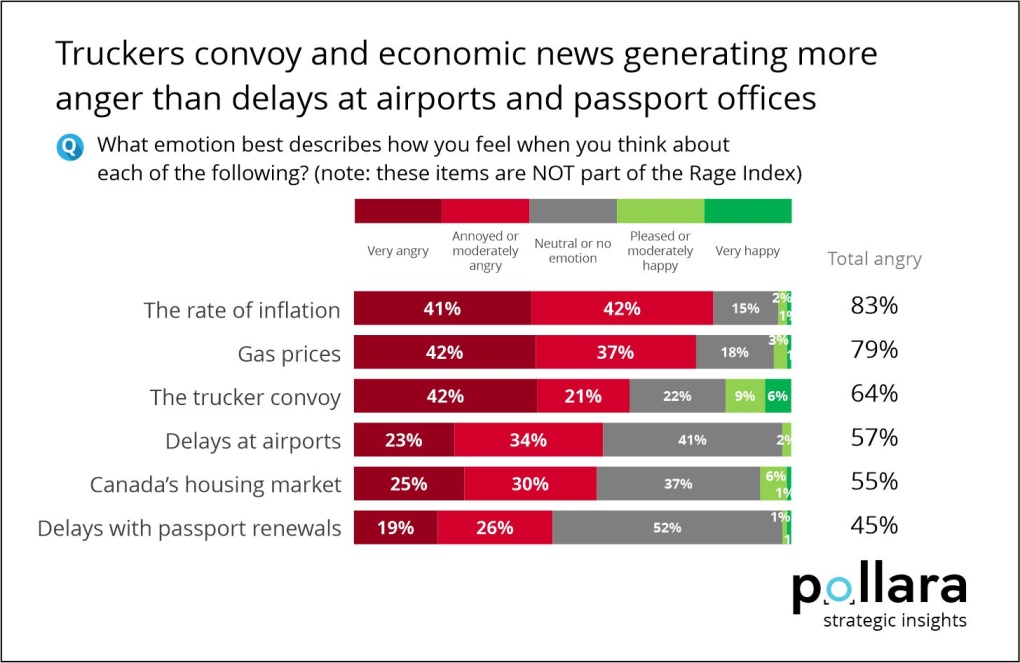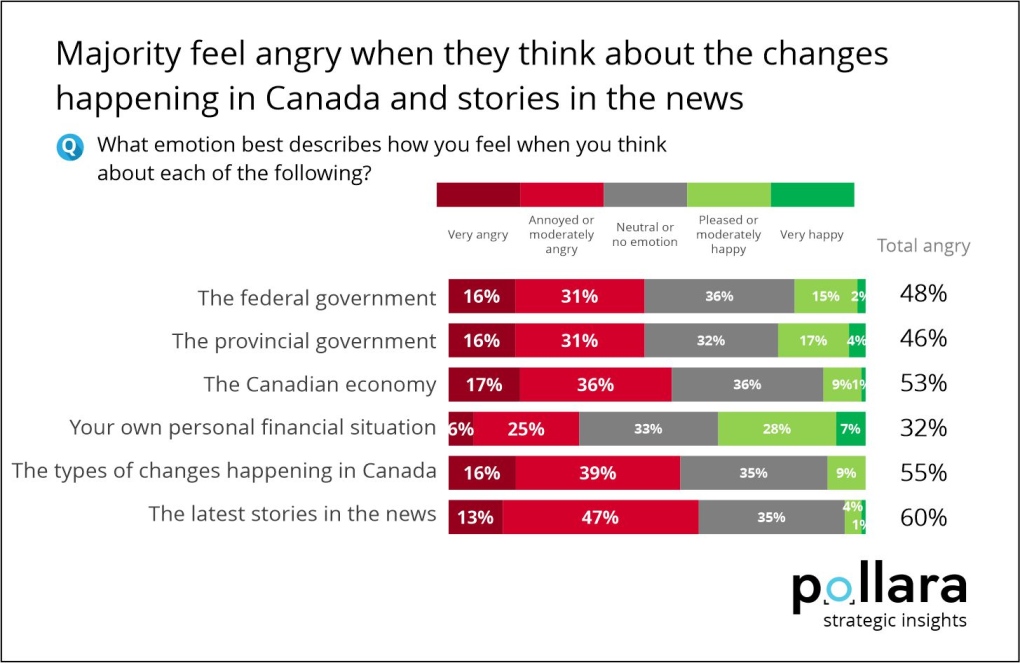New 'Rage Index' finds Prairie provinces angrier than other jurisdictions in Canada
A research company based out of Toronto has launched what it calls its "Rage Index," which probes what issues Canadians are currently angriest about.
Pollara Strategic Insights launched the monthly Rage Index on Monday, and found that the topics that make the majority of Canadians angry is recent news stories, inflation and the trucker convoy.
"Right now, inflation and gas prices are the highest," said Dan Arnold, chief strategy officer with Pollara.
"You've got at least eight out of 10 people who are somewhat angry at that, and four in 10 who are 'very angry,'" he said.
 Aug. 29, 2022 (Pollara Insights)
Aug. 29, 2022 (Pollara Insights)
The company surveyed about 2,000 Canadians between July 25 and Aug. 2 to complete the poll.
The Rage Index found that the Prairie provinces of Saskatchewan and Manitoba were the most frustrated, with 55 per cent of respondents being generally "annoyed" or "angry" with the current state of affairs in Canada.
Quebec seemed the least perturbed, with 43 per cent of respondents saying they were angry or annoyed.
Alberta was the second angriest province, according to respondents, with 53 per cent reportedly being angry, followed by Ontario at 51 per cent, and tailed by the Atlantic provinces and B.C. which tied with 49 per cent.
 Aug. 29, 2022 (Pollara Insights)
Aug. 29, 2022 (Pollara Insights)
In general, men and women reported being similarly angry with living conditions in Canada, while middle-aged Canadians were the age group that reported the highest levels of anger.
Lower income earners and people who were born in Canada were also angrier than their counterparts, according to the poll.
The Rage Index has a margin of error of 2.2 per cent, 19 times out of 20, according to Pollara.
The full survey report can be found on the Pollara Strategic Insights website.
CTVNews.ca Top Stories

'It could be catastrophic': Woman says natural supplement contained hidden painkiller drug
A Manitoba woman thought she found a miracle natural supplement, but said a hidden ingredient wreaked havoc on her health.
After hearing thousands of last words, this hospital chaplain has advice for the living
Hospital chaplain J.S. Park opens up about death, grief and hearing thousands of last words, and shares his advice for the living.
WHO likely to issue wider alert on contaminated cough syrup
The World Health Organization is likely to issue a wider warning about contaminated Johnson and Johnson-made children's cough syrup found in Nigeria last week, it said in an email.
WATCH Video shows dramatic police takedown of carjacking suspects chased through parking lot north of Toronto
Police have released video footage of a dramatic takedown of a group of teens wanted in connection with an attempted carjacking in Markham earlier this month.
Canada, G7 urge 'all parties' to de-escalate in growing Mideast conflict
Canada called for 'all parties' to de-escalate rising tensions in the Mideast following an apparent Israeli drone attack against Iran overnight.
'It was all my savings': Ontario woman loses $15K to fake Walmart job scam
A woman who recently moved to Canada from India was searching for a job when she got caught in an online job scam and lost $15,000.
Families to receive Canada Child Benefit payment on Friday
More money will land in the pockets of some Canadian families on Friday for the latest Canada Child Benefit installment.
After COVID, WHO defines disease spread 'through air'
The World Health Organization and around 500 experts have agreed for the first time on what it means for a disease to spread through the air, in a bid to avoid the confusion early in the COVID-19 pandemic that some scientists have said cost lives.
American millionaire Jonathan Lehrer denied bail after being charged with killing Canadian couple
American millionaire Jonathan Lehrer, one of two men charged in the killings of a Canadian couple in Dominica, has been denied bail.






























